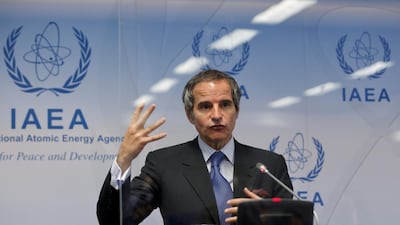A revival of the 2015 Iran nuclear deal will have to wait for the formation of a new Iranian government, the head of the UN nuclear watchdog has said.
Presidential elections take place in Iran on Friday.
Negotiators in Vienna are making slow but steady progress on a return to the 2015 accord, but have yet to hammer out an agreement.
"Everyone knows that, at this point, it will be necessary to wait for the new Iranian government," said Rafael Grossi, the head of the International Atomic Energy Agency, when asked about the progress of the negotiations.
The IAEA is not directly involved in the Vienna talks, which began in April, but it plays a crucial role inspecting Iran's nuclear sites.
"The discussions that have been going on for weeks have dealt with very complex and delicate technical questions, but what is needed is the political will of the parties," Mr Grossi told Italian newspaper La Repubblica.
Iran's envoy to the Vienna talks said a conclusion to the negotiations was unlikely this week.
“I believe we need to return to capital cities at least one more time. So I don’t think we’ll reach a conclusion in this round of talks ... I can’t even predict how many days this round of talks will last," Abbas Araghchi told Iranian state television.
A top European diplomat said on Tuesday that he believed international negotiations with Iran would ultimately succeed in reimposing limits on its nuclear programme, but more time may be needed.
Enrique Mora, who is co-ordinating the talks in Vienna, said progress had been made on key obstacles at the talks.
Mr Mora said outside the hotel where Iranian officials met envoys from Russia, China, France, Germany and Britain, that he could "not say that this is the last round" of talks.
“I don’t know, really. I mean we are closer now, obviously. But I don’t know,” he said.
Mr Mora said the delegations “complained about the presence of some demonstrators close to the premises of the conference", which he reported to the police twice.
“What happened next, I was not informed. It’s not my business. It’s something for the Austrian police,” he said.
An agreement in 2015 imposed strict curbs on Iran’s nuclear activities in exchange for easing American sanctions, but former US president Donald Trump withdrew the US from it three years later.
The US is not taking part in the Vienna talks but sent a senior diplomatic delegation to the Austrian capital to discuss the issue with many of the envoys taking part, including Russian officials.
The Iran nuclear talks have brought about some alignment between Moscow and Washington despite years of recent tension.
The issue is likely to be discussed at Wednesday’s summit meeting in Geneva between US President Joe Biden and Russian leader Vladimir Putin.


